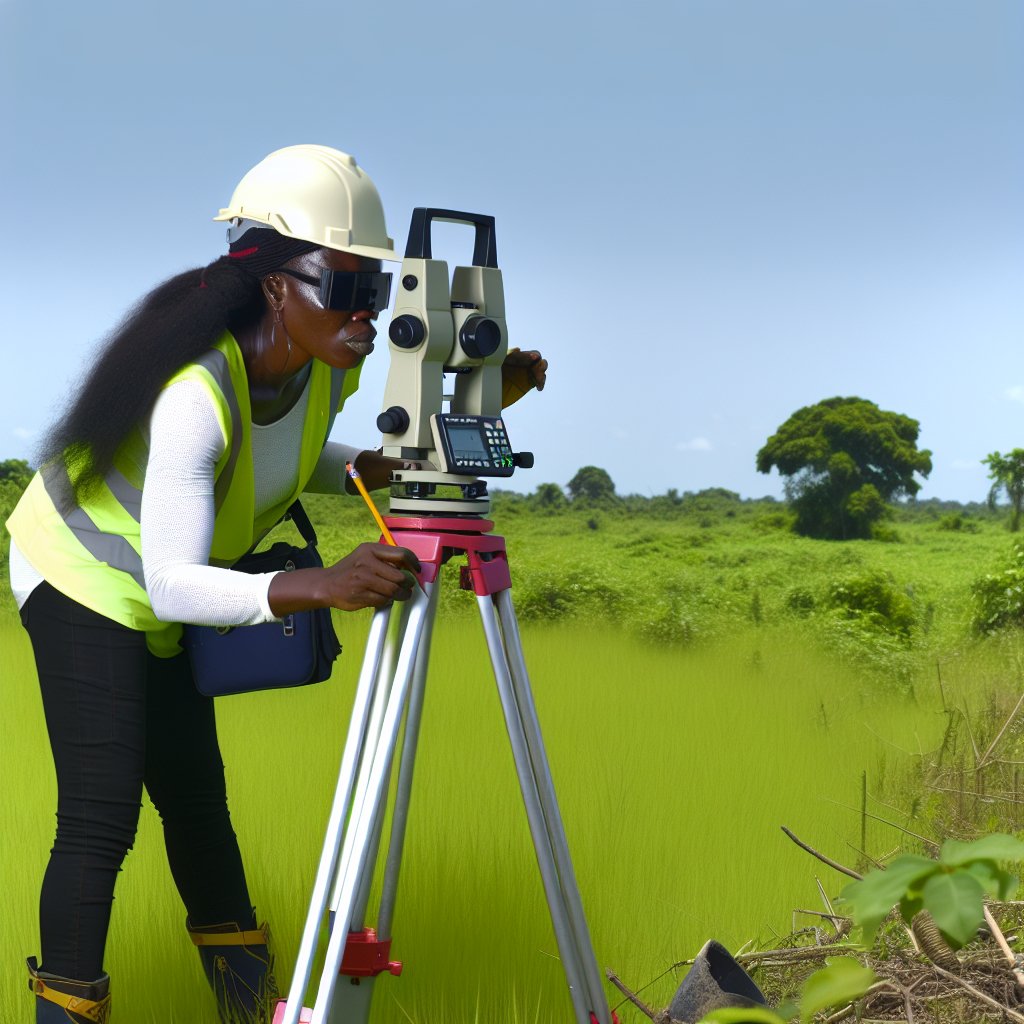Introduction
Land surveying involves measuring and mapping the Earth’s surface to determine boundaries and physical features.
It is a critical tool in various fields such as construction, urban planning, and environmental management.
In environmental impact studies, land surveying plays a crucial role in assessing the impact of proposed projects on the environment.
This includes analyzing the potential effects of construction activities on ecosystems, water bodies, and wildlife habitats.
By accurately mapping the land and collecting data on existing conditions, surveyors help environmental scientists and policymakers make informed decisions.
They aim to minimize negative impacts and protect natural resources.
Understanding Environmental Impact Studies
Definition of environmental impact studies: Environmental impact studies are comprehensive assessments intended to identify and evaluate the potential environmental implications of a proposed project or development.
Purpose of conducting environmental impact studies: The main purpose of conducting environmental impact studies is to analyze and mitigate potential negative effects on the environment, such as pollution, habitat destruction, and resource depletion.
Importance of considering land surveying in environmental impact assessments: Land surveying is crucial in environmental impact assessments as it provides essential data on land boundaries, topography, vegetation cover, and soil characteristics. This data helps in accurately assessing the impact of a project on the environment.
Role of Land Surveying in Site Analysis
Land surveying plays a crucial role in identifying potential sites for development projects.
It helps in mapping existing land features, such as topography, vegetation, and soil types, for better planning.
Survey data is used to assess the impact of proposed projects on the environment, ensuring sustainable development.
- Land surveying plays a crucial role in identifying potential sites for development projects.
- It helps in mapping existing land features, such as topography, vegetation, and soil types, for better planning.
- Survey data is used to assess the impact of proposed projects on the environment, ensuring sustainable development.
Learn More: Influence of Climate on Nigerian Architectural Designs
Impact of Land Surveying on Environmental Conservation
Land surveying plays a crucial role in environmental impact studies by providing essential data that helps in assessing and managing the impact of human activities on the environment.
Monitoring land use changes over time:
- Land surveying helps in monitoring changes in land use patterns over time, such as urban expansion, deforestation, or agricultural practices.
- By tracking these changes, environmentalists can identify areas that require conservation efforts to protect natural habitats and biodiversity.
Identifying areas of environmental concern through surveying techniques:
- Surveying techniques like LiDAR and GIS mapping can identify areas at risk of environmental degradation, such as erosion-prone zones or water pollution hotspots.
- This information is crucial for policymakers and environmental agencies to prioritize conservation efforts and implement mitigation strategies.
Providing data for sustainable land management practices:
- Land surveying generates data on soil type, topography, vegetation cover, and other environmental factors essential for sustainable land management.
- This data supports the development of land use plans that balance human activities with environmental conservation goals.
Land surveying plays a vital role in environmental impact studies by enabling the identification of environmental concerns, monitoring changes in land use, and supporting sustainable land management practices.
Gain More Insights: Famous Nigerian Architects and Their Iconic Works
Importance of Accurate Data in Environmental Impact Studies
Land surveying plays a crucial role in providing accurate data for environmental impact studies.
It involves the use of precise measurements to gather information about the land and its features.
Role of Precise Measurements in Land Surveying
- Precise measurements are essential in determining the exact boundaries of a site.
- They help in identifying any topographical features that may affect the surrounding environment.
- Accurate measurements ensure that the impact of any proposed development can be assessed effectively.
Ensuring Reliable Data for Impact Assessments
- Reliable data obtained through land surveying is critical for conducting impact assessments.
- It helps in evaluating the potential effects of a project on the environment and surrounding ecosystems.
- Survey data provides a baseline for comparison before and after a project is implemented.
Highlighting the Significance of Accurate Survey Data in Decision-Making Processes
- Accurate survey data is essential for making informed decisions about land use and development.
- It allows stakeholders to assess the environmental consequences of their actions before proceeding.
- Having reliable data ensures that decision-making processes are based on factual information rather than assumptions.
The role of land surveying in providing accurate data for environmental impact studies cannot be understated.
It is through precise measurements and reliable survey data that stakeholders can make informed decisions.
They can assess the potential environmental impacts of their actions.
Learn More: Surveying in Rural vs. Urban Areas: Key Differences

Collaboration Between Land Surveyors and Environmental Experts
Interdisciplinary collaboration is crucial in environmental impact studies.
It enhances the accuracy of data collection and analysis.
Such collaboration ensures a comprehensive perspective on project boundaries.
It facilitates the identification of potential environmental risks.
Moreover, it promotes sustainable development practices.
Benefits of Incorporating Land Surveying Expertise in Environmental Assessments
Land surveying provides precise mapping of land features and topography.
It helps in determining land use patterns and changes over time.
This expertise assists in monitoring the environmental impacts of construction projects.
Additionally, it supports decision-making for land management and conservation efforts.
Examples of Successful Projects
One example is a wetland restoration project.
In this project, surveyors mapped the terrain while ecologists assessed the ecological impact.
Another successful project involved urban redevelopment.
Here, land surveyors identified contamination sites, and environmental scientists examined soil quality.
Infrastructure development also saw collaboration between surveyors, engineers, and environmental experts.
This cooperation aimed to minimize ecological disruption.
Transform Your Career with Expert Guidance
Get personalized mentorship consulting that’s tailored to your unique path. Our expert advice is actionable and exclusive.
Get StartedA coastal conservation project is another notable example.
Surveyors mapped shoreline changes while marine biologists studied the impact on biodiversity.
By working together, land surveyors and environmental experts achieve a holistic understanding of human activity impacts.
Their collaboration is essential for conducting thorough environmental impact studies.
Additionally, it enables the implementation of sustainable practices in land development projects.
See Related Content: Scholarships for Marine Engineering Students in Nigeria
Importance of Land Surveying in Environmental Assessments
Land surveying plays a crucial role in environmental impact studies by providing accurate data on land characteristics.
Integrating land surveying in environmental assessments is essential for making informed decisions and minimizing environmental damage.
There is a need for further research and development in this area to improve the accuracy and efficiency of environmental impact studies.
By recognizing the importance of land surveying in environmental assessments, we can better protect our natural resources and ecosystems for future generations.
Additional Resources
Systematic review of climate change impact research in Nigeria …
What are the most ideal project topics for an engineering land …




